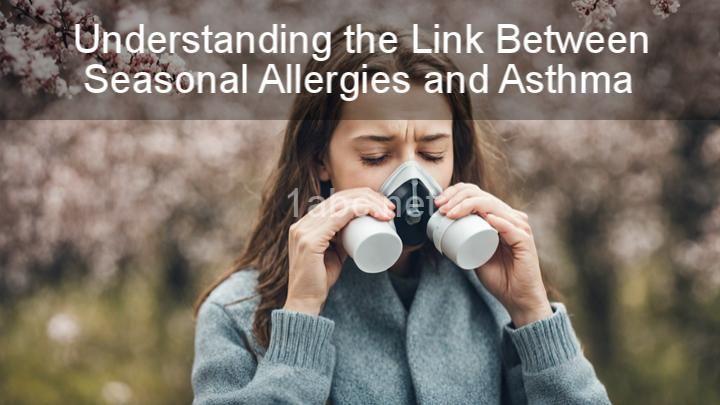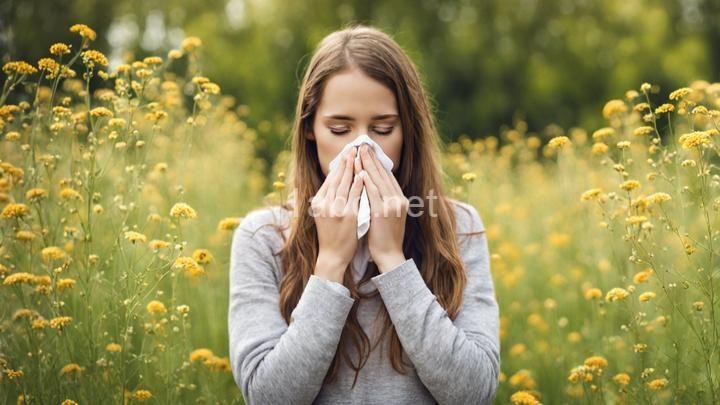Understanding the Link Between Seasonal Allergies and Asthma

Welcome readers! Today, we are going to dive deep into the fascinating topic of seasonal allergies and asthma. These two conditions are quite common, affecting millions of people worldwide. Understanding the link between these two ailments is crucial for effective management and improved quality of life. So, let's get started!
I. What are Seasonal Allergies?
Seasonal allergies, also known as hay fever or allergic rhinitis, are allergic reactions that occur during specific times of the year, usually when certain plants release pollen into the air. Common triggers include pollen from trees, grasses, and weeds, as well as mold spores. When exposed to these allergens, the immune system overreacts, leading to various symptoms.
The symptoms of seasonal allergies can vary from person to person. Common signs include sneezing, itchy and watery eyes, nasal congestion, runny nose, and postnasal drip. Some individuals may also experience fatigue, coughing, and a scratchy throat. The severity of symptoms can range from mild discomfort to severe impairment of daily activities.
II. Understanding Asthma:
Asthma is a chronic respiratory condition characterized by inflammation and narrowing of the airways, making it difficult for air to pass through. It is a complex condition with various triggers, including allergens, pollution, exercise, stress, and respiratory infections. When exposed to these triggers, individuals with asthma experience episodes of wheezing, shortness of breath, chest tightness, and coughing. These symptoms can range from mild to life-threatening, and they may occur sporadically or persistently.
III. The Connection Between Seasonal Allergies and Asthma:
Now, let's explore the intriguing link between seasonal allergies and asthma. Many individuals with asthma also have seasonal allergies, and vice versa. In fact, research has shown that approximately 75% of people with asthma also have allergies, and over 80% of individuals with hay fever have asthma symptoms.
Allergic asthma is a specific subtype of asthma that is triggered by allergens. When individuals with both seasonal allergies and asthma are exposed to allergens such as pollen or mold, their immune system responds by releasing chemicals that cause inflammation in the airways. This inflammation narrows the airways and triggers asthma symptoms. Essentially, the presence of seasonal allergies can worsen or trigger asthma symptoms in susceptible individuals.
For example, if someone with allergic asthma is allergic to pollen, they may experience more frequent and severe asthma attacks during the pollen season. This connection between seasonal allergies and asthma highlights the importance of managing both conditions simultaneously for better control of symptoms.
IV. Shared Risk Factors:
Several risk factors contribute to the development of both seasonal allergies and asthma. One of the main factors is genetic predisposition. If you have a family history of allergies or asthma, you are more likely to develop these conditions yourself. Environmental influences during childhood, such as exposure to allergens or respiratory infections, can also play a role in the development of both conditions.
V. Managing Seasonal Allergies and Asthma:
Now that we understand the link between seasonal allergies and asthma, let's discuss some practical tips for managing both conditions simultaneously.
1. Avoidance measures: Try to minimize exposure to allergens by staying indoors on high pollen days or keeping windows closed. Using air purifiers can also help filter out allergens from indoor air.
2. Medication options: Depending on the severity of symptoms, your healthcare professional may recommend antihistamines to relieve allergy symptoms or inhalers to manage asthma symptoms. It's essential to follow their guidance and take medication as prescribed.
3. Symptom monitoring: Keep track of your symptoms and identify any patterns or triggers. This information can help you and your healthcare professional develop an effective management plan.
4. Allergy shots or immunotherapy: For individuals with severe allergies, allergy shots may be recommended. This treatment involves gradually exposing your body to small amounts of allergens to build tolerance over time.
Remember, everyone's situation is unique, so it's crucial to work with your healthcare professional to find the best management strategies for you.
VI. Seeking Professional Help:
If you suspect that you have seasonal allergies or asthma, it's essential to seek professional help for an accurate diagnosis and personalized treatment plan. Allergy testing and pulmonary function tests can help determine the specific allergens you are sensitive to and assess the severity of your asthma. Regular check-ups with your healthcare professional are crucial for monitoring your condition and adjusting your treatment plan as needed.
Conclusion:
Understanding the link between seasonal allergies and asthma is vital in managing these conditions effectively. By recognizing the triggers and symptoms associated with both ailments, individuals can take control of their health and seek appropriate support. Remember, you don't have to suffer in silence. Reach out to healthcare professionals and develop a personalized management plan that suits your needs. With the right approach, you can minimize the impact of seasonal allergies and asthma on your daily life and breathe easier.
FREQUENTLY ASKED QUESTIONS
How do seasonal allergies trigger asthma symptoms? 🌿🌬️
Seasonal allergies can trigger asthma symptoms through a process known as allergic asthma.
When an individual with asthma is exposed to allergens such as pollen from plants, it can cause an allergic reaction in their airways.
This allergic reaction leads to inflammation and narrowing of the airways, making it difficult to breathe.
In people with seasonal allergies, the immune system mistakenly perceives pollen as harmful, triggering the release of certain chemicals, including histamine.
These chemicals cause the muscles surrounding the airways to contract, resulting in bronchoconstriction.
Additionally, the immune system releases inflammatory substances that further contribute to airway inflammation and mucus production.
Are there specific seasons when the link between allergies and asthma is stronger? 🍂❄️
Yes, there are specific seasons when the link between allergies and asthma is often stronger.
In many regions, spring and fall are the seasons when allergies tend to be most prevalent due to the high amounts of pollen in the air. During spring, trees release pollen, while in fall, ragweed is a common trigger. These seasons can significantly impact individuals with both allergies and asthma, as the high pollen levels can induce or worsen asthma symptoms.
However, it's important to note that not everyone with allergies and asthma will experience symptoms only during these seasons. Some individuals may have year-round allergies, such as dust mite or pet allergies, which can trigger asthma symptoms consistently throughout the year.
Determining specific triggers and the timing of symptom exacerbations can be helpful in managing allergies and asthma effectively. Keeping track of symptoms, identifying patterns, and working with a healthcare provider can aid in developing a personalized treatment plan to minimize the impact of seasonal allergies on asthma symptoms.




